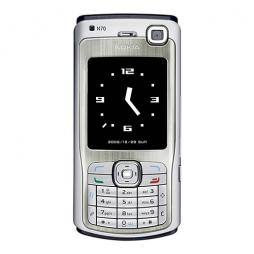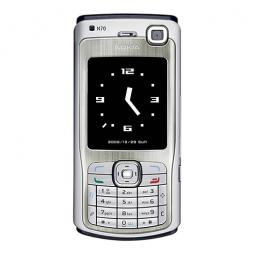Smartphone
Posted by AnneryanHeatwole on Jun 27, 2011
Have you ever had a problem with your neighborhood and wanted to rally your community around finding a solution? Commons, a mobile mapping and reporting game, does just that. Commons is an iPhone app that allows players to locate their position on a map and then guides the players through a series of challenges to report and comment on their neighborhood. Reports can be voted on, so users who submit the best reports or images can win badges that show their involvement. The first real-world gameplay happened lower Manhattan in New York City on June 19th at the Come Out and Play Festival.
| Commons: Real-World Games for Change data sheet 5403 Views |
| Countries: |
United States
|
Posted by radicaldynamic on Apr 06, 2011
Group Complete data sheet 2522 Views
Organization that developed the Tool:
Problem or Need:
Whether in the developing world or the business sector, the majority of mobile data collection efforts parallel the processes set down by their largely paper-based predecessors. In traditional data collection systems information is collected from a variety of sources, funnelled to a single point and eventually compiled, sorted and (hopefully) acted upon. In many cases this workflow meets the basic needs of data consumers and in some cases is preferable.
Let's consider some of the challenges posed by traditional one-way data collection systems.
- The people performing data collection (usually referred to as "mobile workers") don't have access to the wealth of raw information available to data consumers. This makes mobile workers outsiders to the big picture and lessens their potential contributions to the overall data collection effort.
- Solutions pull collected data into a black hole: once it's submitted there's very little the mobile worker can do to access it for review or to make corrections.
- Implementations often force knowledgeable team members to work in a void. If data cannot be easily and seamlessly shared between team members collaborative efforts will be impeded and their overall effectiveness reduced.
- When team members cannot "see" what others in the group are doing, the chances of double-entry and redundant information are all the more likely.
- When aggregated data finally returns to mobile workers it is often severely outdated.
- Solutions are not really mobile if they require workers to access desktops or laptops to complete tasks essential to the data collection process. This is also true if the tools make it impossible to take pertinent portions of the data set with them for online & offline use.
Brief Description:
Group Complete has coupled the power and open architecture of Open Data Kit and XForms standards with CouchDB to provide a mobile and real-time collaborative data collection platform.
Tool Category:
App resides and runs on a mobile phone
App resides and runs on a server
Is a web-based application/web service
Key Features :
- Share collected data between mobile team members and data consumers in real-time
- Allow team members to collaborate on data entry and review collected data, regardless of their locations
- Reduce double entry, increase team cooperation and still employ more traditional workflows when needed
- Perform all of the major functions of data collection on a smartphone (form building, data entry & export)
- Use Group Complete Mobile to work offline
- Integrate with Open Data Kit and XForms workflows
Main Services:
Voting, Data Collection, Surveys, and Polling
Location-Specific Services and GIS
Mobile Social Network/Peer-to-peer
Information Resources/Information Databases
Program/Code Language:
Java/Android
Javascript
Other
Organizations Using the Tool:
Number of Current End Users:
Number of current beneficiaries:
Support Forums:
http://www.groupcomplete.com/help
support@groupcomplete.com
Languages supported:
English (multi-lingual capable)
Handsets/devices supported:
All versions of Android 2.2, 2.3 and 3.x supported. Support for Android 2.1 coming soon.
Is the Tool's Code Available?:
Is an API available to interface with your tool?:
Posted by AnneryanHeatwole on Mar 25, 2011
Today's Mobile Minute brings you coverage on smartphone security and malware, the struggle for mobile money systems in Africa to reach the level of M-PESA in Kenya, Facebook's move toward feature phones, the success of messaging-specific feature phones, and a guide to mobile donations for Japan.
- After more than 50 Android apps were discovered to be carrying malware in early March, the BBC took a look at mobile security. From the risks involved in keeping a lot of personal data on mobiles to ways in which malware can be used to manipulate phones, the article explores the need for mobile security around smartphone applications.
- In Africa, mobile banking has certainly garnered a lot of publicity and press. But All Africa looks at some of the drawbacks of mobile banking in specific countries where mobile banking systems are active; specifically, the article focuses on the "walled garden" system which makes it expensive to transfer funds between different mobile operators (sometimes with fees from five to 20 percent higher than a transfer between two users on the same mobile operator).
- Facebook recently bought Snaptu, a company that develops applications for feature phones. Snaptu developed Facebook's first feature phone app, and Facebook has now reportedly acquired the company for close to $70 million dollars. The purchase could indicate that Facebook plans to focus on reaching non-smartphone users around the world.
- Cellular-News reports that by 2015, messaging-specific feature phones will grow to encompass 1/3 of all shipped feature phones. Feature phones make up 75% of the handset market, and feature phones that are optimized for messaging services (such as "SMS, MMS, mobile email, and mobile IM") are expected to increase in popularity.
- Want to send a mobile donation to a specific cause for tsunami relief in Japan? Into Mobile has a roundup of shortcodes and the organizations that use them so that you can easily find the best way to donate.
[Mobile Minute Disclaimer: The Mobile Minute is a quick round-up of interesting stories that have come across our RSS and Twitter feeds to keep you informed of the rapid pace of innovation. Read them and enjoy them, but know that we have not deeply investigated these news items. For more in-depth information about the ever-growing field of mobile tech for social change, check out our blog posts, white papers and research, how-tos, and case studies.]
Image courtesy Flickr user QiFei
Posted by AnneryanHeatwole on Feb 07, 2011
Today's Mobile Minute brings you coverage on how the Egyptian government shut down the country's Internet and mobile services, work-arounds for communicating during a government-ordered Internet blackout, problems with keeping customers engaged in mobile banking and payment services, Android's new place as the top-selling mobile operating system in the world, and a prediction for huge increases in mobile data traffic by 2015.
- In the aftermath of the Egyptian telecommunications blackout, ArsTechnica looked at both how the Egyptian government managed to limit the country's communications so effectively (mainly through ordering major ISPs and Telcos to shut off service) and if a government-mandated Internet/mobile lockdown could be recreated in other countries. In related news, Wired.com has created a wiki on how to communicate if the government limits/shuts down Internet access.
- Vodafone announced that the Egyptian government invoked emergency powers and forced it and the other telcom providers in Egypt to send pro-government text messages to Egyptian subscribers. In a press release, Vodafone claims that the messages were not scripted by Vodafone, and that although they protested the government's involvement, they "do not have the ability to respond to the authorities on their content." Since then, a much-nedeed debate has begun on the responsibility of telcoms to resist this interference.
Posted by MohiniBhavsar on Aug 18, 2010
Open Data Kit: Implications for the Use of Smartphone Software Technology for Questionnaire Studies in International Development data sheet 1882 Views
Author:
Frances Jeffrey‐Coker, Matt Basinger and Vijay Modi
Abstract:
During a study conducted in January 2010 by researchers of the Columbia University Mechanical Engineering Department in New York City, approximately 300 farmers were surveyed in rural Mali. Farmers were randomly sampled via standard proportional, stratified, cluster techniques. Data collection took place through the use of HTC G1 smartphones running Google’s Android operating system. The phones were equipped with Open Data Kit (ODK) software; a system that immediately digitizes data for analysis, allows for remote monitoring of the collection progress, and facilitates the gathering of data, eliminating the need for paper surveys and therefore significantly reducing survey times. ODK has the potential for a profound impact on the future of data gathering, particularly in development applications where locations may be remote and budgets tight, yet where mobile phone use is rapidly increasing with the expansion of service
coverage.
Posted by PrabhasPokharel on Aug 14, 2010
Your Smartphone is Now a Mobile News Studio data sheet 2366 Views
Abstract:
Mobile phones have become a critical mobile news reporting tool. They can be a very effective way to produce content and transmit that content back to the studio very cheaply. The presentation presents real world examples of how mobile phones have been used in reporting contexts to great effect, tools that can help reporters do this reporting, and things to keep in mind (such as battery levels). The presentation also includes the author's recommendations for the best apps for mobile journalism.
Posted by AJuOnLiNE on Feb 23, 2009
I am currently working on developing a client application for Sahana, which can also act as a standalone data collecting tool for field reporters and people working in the process of disaster relief & management.
What is Sahana?
"...Free and Open Source Disaster Management system. It is a web based collaboration tool that addresses the common coordination problems during a disaster from finding missing people, managing aid, managing volunteers, tracking camps effectively between Government groups, the civil society (NGOs) and the victims themselves." - Source - http://www.sahana.lk
What is Openmoko™?
1. Openmoko is a Linux distribution designed for open mobile computing platforms, such as, but not limited to, cellphones.
2. Openmoko is the company behind the Openmoko Linux distribution. Openmoko also manufactures mobile computing platforms, such as the Neo FreeRunner.”



